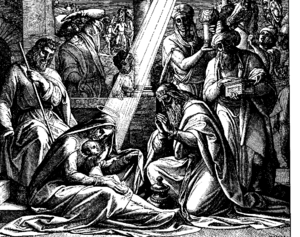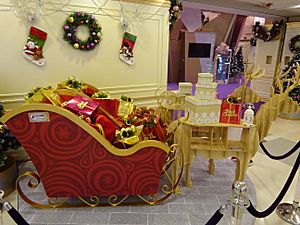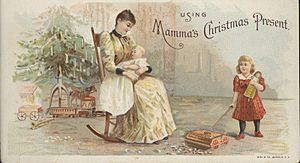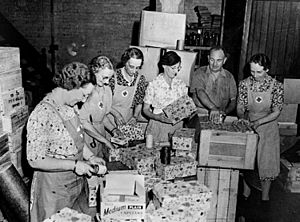Christmas gift facts for kids

A Christmas gift or Christmas present is a special item given to someone during the Christmas season. People often exchange these gifts on Christmas Eve (December 24), Christmas Day (December 25), or on Twelfth Night (January 5). This last day marks the end of the twelve-day Christmas season.
For Christians, giving gifts at Christmas has a special meaning. It reminds them of the Three Wise Men who brought gifts to the baby Jesus.
History of Christmas Gifts

Giving gifts is a very old tradition. Over time, it became closely linked with the Christian celebration of Christmas.
In ancient Rome, people might have given gifts around the winter solstice in December. This was part of their Saturnalia holiday.
As Christianity grew in Roman lands, gift-giving often happened on New Year's Day. Around the year 336 CE, December 25 became known as Jesus's birthday. This linked gift-giving to the story of the Biblical Magi bringing presents to baby Jesus.
Another important story is about Saint Nicholas. He was a Christian bishop in the 300s who was known for giving gifts. These stories slowly made gift-giving a key part of Christmas in many countries. In some other Christian places, gifts are given earlier in Advent, on Saint Nicholas Day.
At first, some rulers thought the gift-giving story meant people should give gifts to them. They asked for tributes during this time. This changed around the year 1000. The story of Good King Wenceslas, another famous gift-giver, became popular.
After this, giving gifts to rulers became less common. Around the time of the Protestant Reformation, giving gifts to children became much more popular in Europe. This custom then spread to the United States in the 1800s.
This change also happened as some parents wanted children to stay home. They wanted to keep them away from the noisy street celebrations.
The timing of Christmas gift-giving also changed. For many centuries, gifts were given on December 6 (around Saint Nicholas Day) or in early January. But after the poem The Night Before Christmas (1823) and the book A Christmas Carol (1843) became popular, things shifted.
By the late 1800s, Christmas Eve became the most common day for gift-giving in Western culture. Some cultures still give a gift for each of the twelve days of Christmas. Others only give gifts on Christmas Day or Twelfth Night.
How Christmas Gifts Affect the Economy

The tradition of gift-giving is very important for businesses. The weeks and even the whole month before Christmas become a very busy and profitable time for stores. Around the early 1900s, stores started advertising to children. They hoped kids would ask their parents to buy more toys and other items.
The weeks before Christmas used to make up 80% of all toy sales each year. In the UK, families might spend hundreds of pounds on presents. For example, in 2020, people expected to spend about £1.1 billion on toys. An average of £105 was spent on gifts for younger children.
In the early 2000s, people in the U.S. spent over $4 billion every day during the Christmas shopping season. An average person might spend over $1,000 on gifts.
Some people worry that Christmas gift-giving has become too focused on money. A survey in 2016 found that 70% of people felt too much attention was on spending at Christmas. About 42% felt forced to spend more. Some even borrowed money to buy gifts.
An economist named Joel Waldfogel studied Christmas gifts. He found that sometimes the person receiving a gift doesn't value it as much as the giver paid for it. This means some of the gift's value is "lost." Because of this, gifts are often returned, sold, or given to someone else.
In the 2016 survey, 15% of people were not happy with their gifts. 10% couldn't even remember what they got. About 25% gave their presents to someone else. 14% sold them, and 10% tried to return them to the store. Gifts that people often don't like include perfumes, decorations, and clothes, because these depend a lot on personal taste.
Wrapping Gifts
Researchers from the University of Nevada found something interesting about gift wrapping. They discovered that gifts that are not wrapped perfectly often get a better reaction. This is because neatly wrapped presents can make the person receiving them expect too much.
 | Selma Burke |
 | Pauline Powell Burns |
 | Frederick J. Brown |
 | Robert Blackburn |



